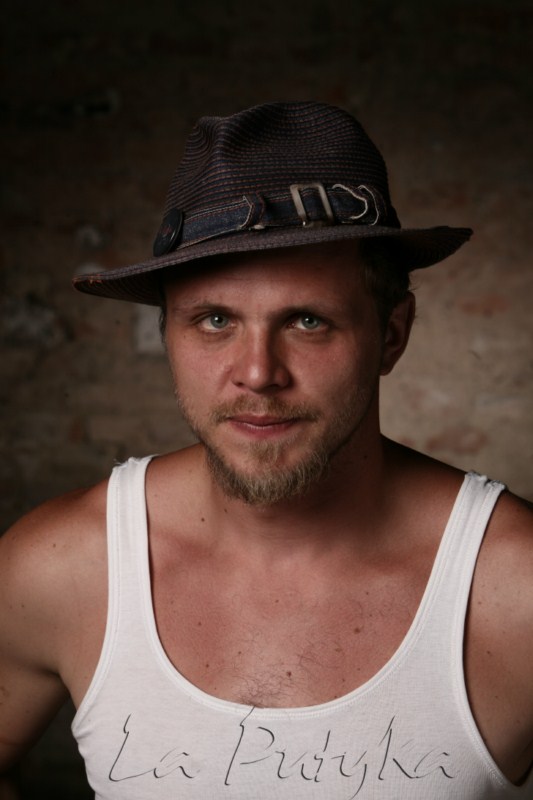about the production
The tradition of folk and fairground theatre, the existence of fools, clowns and jugglers was during the Middle Ages and Renaissance a part of culture and social life in Europe. Bizarre faces and expressions of clowns, puns in the mixture of languages of all who have come here from the neighbourhood, the body as an important communication means, by then not subordinated to the word, music, comicality which did not know any limits or taboos and the laughter, cathartic and liberating – this all inseparably belonged to the then towns and villages. Today this vital world speaks to us from the works by Rabelais, Villon or Boccaccio. And unwittingly it is reminded to us in the production called La Putyka (La – Italian article; putyka – a Czech word denoting a typical pub, especially the one where beer is served).
Despite we leave from the performance with a light head and the feeling of a nice experience, we still feel something deeper inside it. At first sight La Putyka offers only original images of the traditional Czech pub performed by actors, dancers, acrobats and martial arts masters. The playfulness the producers speak to us by, the coarse comicality of the songs, crawling of disobedient bodies, images of ordinary human dreams and the effort to fulfil them, which always fail because of those disobedient and imperfect bodies – this all is hidden somewhere deep inside our unconsciousness like an image of decline which causes in us a panic fear. And it is exactly these images the medieval and Renaissance theatre (literature and visual art) performed in order to unveil also this part of our life with bodies and in bodies. And only by this kind of theatre the medieval and Renaissance man was able to live easily. Sometimes during the Enlightenment the words comedian, juggler, jester, which had been before taken seriously, became offensive. Our theatre became institutionalized, the stage got “cleaned up” and there was not a place for a fool anymore. Moreover, the comedians were to be to get rid of, preferably in the best exemplary manner. In 1809 J. W. Goethe said about one of his actors: “…this man, who always plays the comedian and does not want to understand what should the actor of the Weimer Court Theatre look like, ought to be to get rid of, and with no hesitation make him a guard.” Our new era seized our mind, the theatre and stage had to educate the new man who would be “normal”, easily becoming a reliable link of the new society and without problems joining the producing process of the coming industry. Comedians would have been a bad instance. The vision of the new mission of the then theatre is well illustrated by the statement from 1768 by Joseph von Sonnenfels, the first officially appointed theatre censor in the German speaking region: “To the national morals the stage is able to breath in a certain aspect of decency and to purify the speaking manners of the society.” We built houses to such theatre, and such normal theatre is paid from our taxes.
By its spirit La Putyka is a comedy performance and has nothing to do with any theatre institution (this perfect projection of social order and control). It returns to the roots of European theatre. But it is not historical reconstruction – it speaks the modern language about today’s problems, it speaks to us very openly and playfully. Already in the first minutes it destroys all rules of theatrical conventions we are used to and frees those images in us sleeping in the prison of routine, rationality and instrumental behaviour. This is why, in fact, the sad stories of the grotesque characters on the stage have a liberating impact on us. And that is why we feel in the performance some exceptional depth.
Ján Šimko
creators
music: Jan Maxian, Vojtěch Dyk, Jakub Prachař a Petr Kalab
set design: Hynek Dřizhal and company
costumes: Kristina Zaveska
cast: Jiři Kohout, Petr Horníček, Jiří Weissmann, Lenka Vágnerová, Pavel Mašek, Petr Dejl, Tereza Toběrná, Zbyněk Šporc, Rostislav Novák, Anna Schmidtmajerová, Vojtěch Fülep
production, PR: Vít Novák, Kristýna Milaberská, Helena Rousová, Jiří Sulženko
director

Rostislav Novák (1979) is a renowned Czech performer, circus artist, actor, acrobat and puppeteer. He is a representative of the eighth generation of the puppeteers’ family of Kopecký. His production called 8 – polib prdel kosům, created with the directors‘ tandem SKUTR (Martin Kukučka and Lukáš Trpišovský), was nominated for the Alfréd Radok Prize in the Talent of the Year category and the City of Plzeň Award at the Skupova Plzeň Festival. In 2008 he led a workshop for the famous Canadian new circus Cirque du Soleil. He performs in the productions by the SKUTR, in the Minor Theatre, National Theatre (The Inspector-General), Divadlo v Celetné (Labyrint světa a ráj srdce), Divadlo ABC (Tristan and Isolde) and in the production Hidden Landscapes by the DOT 5O4. “I have weakness for the French new circus and with the SKUTR I have realised that the Czech audience responds to it. That was enough for the base,” explains this artist, known mainly from TV series, why he decided for the La Putyka project, which, based on the new circus genre, connects acrobatics, dance, puppets and sports. This year Novák was awarded as the theatre personality of the year at the Next Wave Festival.
At the same time, he received the Divadelní noviny and Sazka Award in the Alternative Theatre category for the authorship and concept of the production of La Putyka. In May 2010 La Putyka took part in the Czech cultural representation at the 2010 EXPO in Shanghai.
Materials available
Script of the production: EN
If you are interested in these materials, write to archivy@nitrafest.sk
